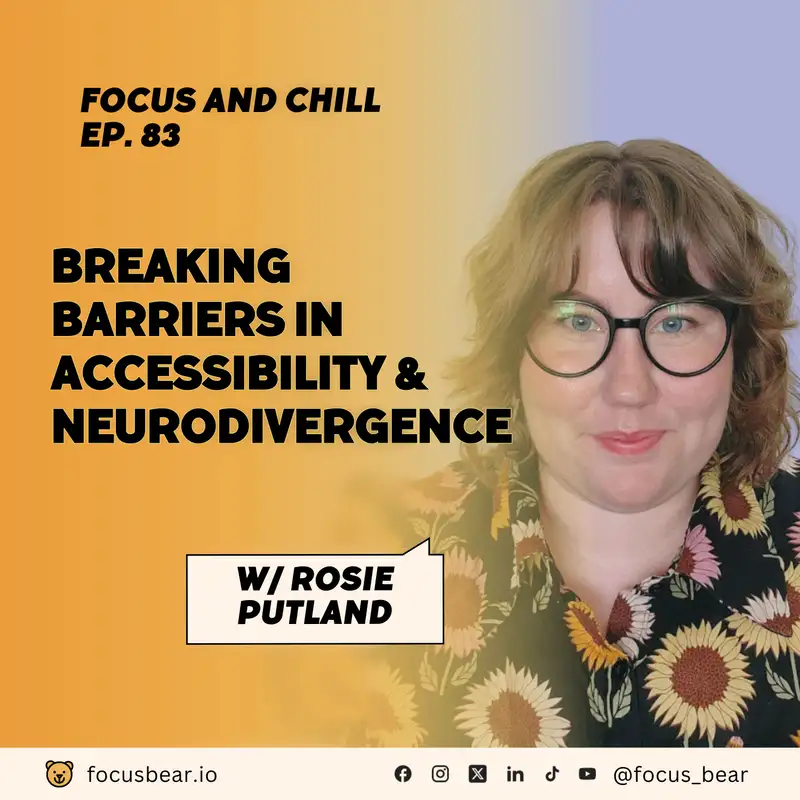Welcome to episode #83! We’re thrilled to be joined by Rosie Putland today.
Rosie Putland is a proudly disabled and autistic public speaker, creative consultant, and co-founder of Modality Co, a digital accessibility consultancy focused on creating connection through accessibility. She is passionate about working with teams and leaders to develop sustainable, holistic digital accessibility practices.
Rosie is known for her ability to create engaging presentations that change perspectives, her unwavering commitment to the accessibility and disability community, and her special interest in ducks.
In this episode, we discuss Rosie’s journey of discovering she was autistic, her experience with autistic burnout, the importance of digital accessibility, and how organizations can create more inclusive online experiences.
Welcome to the show, Rosie!
Questions
JN: When did you first realize you were neurodivergent?
- Always felt different growing up but attributed it to other factors (poverty, family violence, being queer)
- Noticed similarities with other neurodivergent people before having the language for it
- At 16, found an online document on autistic traits and highlighted everything that applied
- Self-identified before formal diagnosis at 20 due to severe autistic burnout
JN: What was your experience with autistic burnout?
- Felt deep apathy toward everything, including special interests
- Struggled with severe insomnia and inability to care for herself
- Had difficulty navigating support systems like Centrelink
- Took six to eight months to recover from burnout and start rebuilding
JN: How did formal diagnosis change things for you?
- Brought relief and validation after years of feeling misunderstood
- Required recontextualizing her entire life through an autistic lens
- Helped her shift from internalized shame to self-acceptance
- Allowed her to create accommodations that support her well-being
JN: What challenges do you still face today?
- Neurodivergence intersects with other health conditions (e.g., rheumatoid arthritis, cancer treatment)
- Lack of resources on navigating major health challenges as an autistic person
- Difficulty finding information or medical professionals who understand both autism and chronic illness
JN: How do you approach disclosure of neurodivergence?
- Faces discrimination whether she discloses or not, but prefers to control her own narrative
- Chooses to disclose because it helps others understand rather than make incorrect assumptions
- Advocates for meeting people where they are in their neurodivergence journey
JC: What strengths are you leaning into now in your work at Modality Co?
- Intuition & Pattern Recognition – Quickly identifies problems and potential risks
- Strong Sense of Justice – Drives her advocacy and push for meaningful change
- Ability to Learn Quickly – Picks up new skills and adapts to different challenges, which helps in entrepreneurship
JC: Can you tell us about your work at Modality Co and the Tasmanian Digital Accessibility Community?
- Modality Co: Helps businesses create accessible digital products and services
- Works with companies to meet Web Content Accessibility Guidelines (WCAG)
- Runs training and consulting programs to improve digital accessibility
- Tasmanian Digital Accessibility Community: Monthly meetups fostering the accessibility and disability community
JC: What do you enjoy doing in your free time?
- Loves spending time near reserves to watch ducks (but doesn’t have pet ducks yet!)
- Reads nonfiction and sci-fi, especially books by disabled authors
- Enjoys knitting, sewing, gardening, and interior design
JC: How do you optimize productivity during your working hours?
- Finds co-working/body doubling extremely effective for staying focused
- Uses Twitch co-working streams when working alone
- Uses five-minute timers to trick her brain into getting started
JC: What productivity advice doesn’t work for you?
- "Eat the frog" (doing the hardest task first) creates anxiety and resistance
- Short work bursts & frequent breaks disrupt flow; prefers long focus sessions
JN: What does your morning routine look like?
- Prefers to be the first one awake for quiet time
- Enjoys breakfast and coffee alone while listening to an audiobook or podcast
- Starts work before business hours to get deep work done without distractions
JN: How do you wind down at night?
- Follows a strict sleep routine to prevent insomnia
- Has mandatory low sensory hours from 8-10 PM for relaxation
- Uses a Manta sleep mask with Bluetooth for audiobooks or meditation
JN: Where can people connect with you?
JC: Final words for the audience?
- "Meet people where they are in their neurodivergence journey."
- "Community is the most powerful tool you can have."
More from Focus Bear:
Website: https://focusbear.io
LinkedIn: https://www.linkedin.com/company/focus-bear/
Youtube: https://www.youtube.com/@focusbearapp
Twitter: https://twitter.com/focusbear1
Instagram: https://www.instagram.com/focus_bear/
Facebook: https://www.facebook.com/focusbearapp/
Podcast: https://podcast.focusbear.io
Tiktok: https://www.tiktok.com/@focusbear
Connect with Jeremy:
LinkedIn: https://linkedin.com/in/nageljeremy
Email: jeremy@focusbear.io
Connect with Joey:
LinkedIn: https://www.linkedin.com/in/joeycorea/
Newsletter: https://thepluckyjester.com/newsletter/
 Episode 83
Episode 83